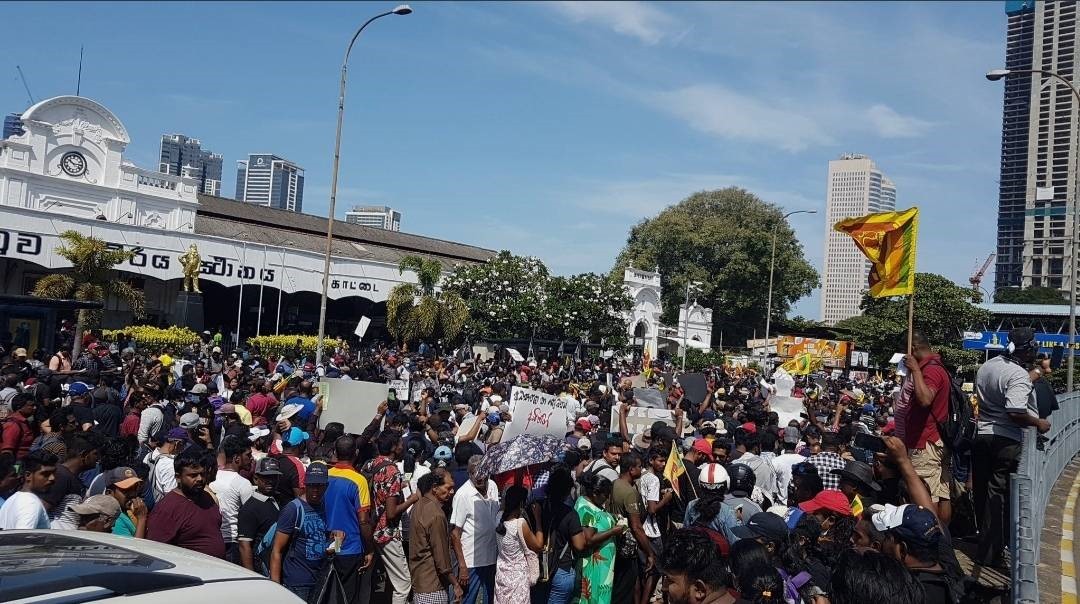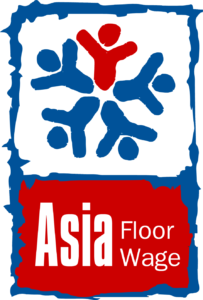The Sri Lanka garment industry was deeply hit by the Covid-19 pandemic and the subsequent economic crisis. Millions of garment workers are now living on the edge, increasingly suffering from volatile incomes, unstable jobs and low savings.
by Vishmee Warnachapa, Sri Lanka Country Coordinator, AFWA
“Watching the Aragalaya march, I felt that Sri Lanka was slowly but surely waking up to a new dawn, notwithstanding a plethora of challenges and profound grief. I hope that the present is a moment for economic and political transformation when we can overcome decades of oppressive policies and social division. I also hope that the working poor will not be forgotten,” said Tharushi*, a garment worker sitting in her sparsely-furnished one-room apartment.
She is one of the many Sri Lankan garment workers closely following the political developments in her country, trying to understand what the economic crisis and the resultant policies could hold for workers like her who have been struggling to access healthcare, transportation and housing over the past several months.

Sri Lankans protest outside the Colombo Fort Railway Station. [Credit: Amalini De Sayrah/AFWA Sri Lanka]
She tells us that she was very ‘hopeful’ and ‘excited’ when Sri Lanka elected its 7th Executive President in November 2019, and that she believed that the government would uphold the policies of ‘one country, one law’, bringing greater prosperity and more employment opportunities to the country. She never anticipated that Sri Lanka would fall into its worst-ever economic and political crisis, less than three years into the presidency.
Sri Lanka, one of the largest garment-producing countries, has been in an economic crisis for several months, with 50-55% inflation rates and more than 50 billion USD of foreign debt. The crisis has made life extremely difficult for economically marginalized communities, including landless peasants, garment workers, and other informal laborers who have always earned poverty-level wages and lacked social security.
“Since April, we have been struggling with daily power cuts and severe shortage of basic needs such as fuel, food and medicines. While our wages have fallen, the prices of vegetables, rice and fish have doubled. There are days when I have stood in long queues for cooking gas, kerosene oil and other necessities – only to come back home empty-handed. Many women workers are walking 3-4 kilometers every day to buy medicines and other necessities, and they hardly have a proper meal a day,” says Shanti, a young garment worker.
The economic crisis has deeply affected the garment sector, which was only slowly recovering from the COVID-19 pandemic-induced recession. Without enough fuel to transport raw materials or run the machines on electricity, garment factories are unable to function at full capacity and dispatch orders on time. Garment workers report that working hours have once again started to reduce, with layoffs increasing and workers constantly fearing that factories will suspend operations.
Chamila Thushari, of Dabindu Collective Union, one of AFWA’s trade union partners, reports that “While garment factories are still providing food, its quantity and quality have declined. Wages of workers are falling as working hours have reduced due to the fuel crisis. We have heard that many factories are laying off manpower workers who already lead very precarious lives.”
Anusha, a garment worker and mother of two young children, tells us, “I earn about 25,000 LKR (71 USD) per month from working in the [garment] factory. I spend almost 15,000 LKR to buy food for our family, as meal packets for a family of four can cost anywhere between 400 – 600 LKR per day. With food prices so high, how can I pay my house rent or buy basic medicines? I have worked in this industry for more than ten years, but I could never save even an additional month’s rent.”
Tharushi tells us that she and many other women garment workers spent all their savings, trying to survive the pandemic, when orders from fashion brands fell and workers lost wages. She said that she has been trying to repay those massive debts that she had incurred when this crisis occurred. “I have friends who pawned their little gold jewelry, the only heirloom in their life to pay for their children’s school fees or to meet their medical needs during the pandemic. They now have no assets or savings to overcome this economic crisis,” she laments.
Sri Lankan garment workers and their trade unions feel that global fashion brands that have sourced from the country for decades must act responsibly and support their workers and suppliers during these times of crisis. Lalitha Dedduwakumara, Chief Organizer of the Textile, Garment and Clothing Workers Union (TGCWU) one of AFWA’s trade union partners, said, “We do not want fashion brands to cut and run from Sri Lanka during this economic crisis. Instead, we want them to support suppliers and workers by providing longer lead times, and offering an urgent humanitarian financial contribution to all their workers in Sri Lanka so that they and their families can at least afford two meals a day.”
While many recognise that this current crisis is a result of the economic mismanagement and corruption which have plagued the government for many years, garment workers believe that their increased vulnerability to it is a result of the business model of global fashion brands.
Workers like Tharushi and Anusha feel that the unwillingness of global fashion brands to ensure living wages and social security for their supply chain workers or even contribute to emergency efforts like the AFWA Supply Chain Relief Contribution during the COVID-19 pandemic have contributed to their inability to meet this economic crisis.
“Our paltry wages, which in normal times can’t help meet additional expenses like an emergency hospital bill, are the reason we have no savings to even have two meals during this crisis. We have spent hundreds of hours standing in factories and stitching for global brands like Next, Victoria’s Secret, Levis, Nike and so on. Yet, our wages are suppressed so that brands and their owners can amass huge profits. I refuse to believe that we did not deserve a living wage for our hard labor. Brands can pay us a living wage, but they choose to watch us starve,” said Anusha.
Sri Lankan workers and their unions are calling on suppliers and brands to engage in dialogue and work collaboratively with them so that workers do not bear the entire brunt of this crisis alone. The trade unions will soon be releasing a charter of demands, echoing the concerns and demands of workers like Tharushi, Anusha and Shanthi.
“A month ago, we joined the first protest by Free Trade Zone workers, in solidarity with the island-wide hartal. We joined, risking everything, including our jobs. But we did so, as we wanted to be part of a movement to rebuild Sri Lanka where there is economic, racial, social and environmental justice for all. We know that the path forward will be difficult, but we remain hopeful about change,” concludes Anusha, rather optimistically.
*To protect women workers’ identities and prevent retaliation, all names used in the article are pseudonyms and factory names have not been given.
See how you can help Sri Lankans garment workers in crisis: Donate to the Sri Lanka Workers’ Community Kitchen

Very nice post. I just stumbled upon your blog and wanted to say that I’ve really enjoyed browsing your blog posts. In any case I’ll be subscribing to your feed and I hope you write again soon!
Do you mind if I quote a couple of your articles as long asI provide credit and sources back to your website?My blog site is in the very same niche as yours and my users would certainly benefit from some of the information you present here.Please let me know if this okay with you. Thanks!
Hello, yes, please go ahead. You can credit it to Asia Floor Wage Alliance.